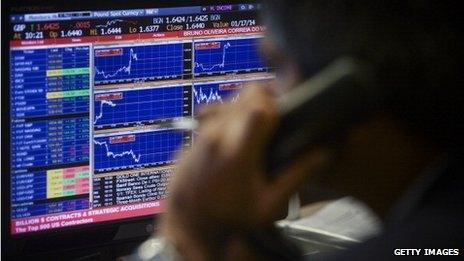Banking standards oversight plan revealed
- Published
Sir Richard Lambert: "It's really difficult to write rules that say what good behaviour is"
Banks would have to report each year on their behaviour and competence under proposals for an independent body to oversee the industry.
The proposals, set out by former CBI chief Sir Richard Lambert, would also assess training programmes for bankers.
The new body would be funded by the banking industry.
But Sir Richard, in his Banking Standards Review, said that it was important that the body was not seen as a mere lobby group for the banks.
Sir Richard, former editor of the Financial Times, was asked to set up the body by the chairmen of Barclays, HSBC, Lloyds, Royal Bank of Scotland, Santander, Standard Chartered and Nationwide.
'Public scepticism'
The aim is that the body would act as an independent champion for better banking standards, and help rebuild trust and confidence in a sector that has been hurt by scandals in recent years.
Sir Richard said: "The objective is a measurable and continuous improvement in the conduct and culture of banks and building societies doing business in the UK.
"The credibility of the new body will be built on the independence of its board, and on widespread industry participation. Its first task will be to define standards of good conduct, and to help drive these into all business activities."
Standards would be designed using guidance from regulators on integrity and transparency, Sir Richard added.
Whistleblowers in banks should not be subject to censure, and issues in different parts of a bank should be discussed within the organisation, he told the BBC.
"By and large there are an awful lot of silos in banks, and problems in silos don't get reported," he said.
Public trust in financial institutions may take a long time to return, he added.
"The public will be sceptical, and they have a right to be sceptical," he said. "It's the job of this body to get people of integrity in the banking system pulling in the same direction."

The banking industry has been mired in scandal in recent years
Trust
Stories of mis-selling, interest rate rigging and big bonuses have dogged the banking industry throughout the financial crisis in recent years.
Matthew Fell, director for competitive markets at the CBI employers' group, said that restoring trust in the banking system was "fundamental" to the future of the UK economy.
He said: "With its emphasis on standards and ethics, Sir Richard's review is an important piece of the jigsaw to help reinforce a culture change that puts the customer at the heart of everything banks do.
"Transparent reporting of performance is important so that banks don't just sign up to these new standards, but live and breathe them.
"Good conduct and ethical behaviour should be important to future career mobility, so the transition to a professional body with individual membership is appealing."
Body "needs teeth"
The proposed body "needs teeth" if it is to have an impact on raising ethical and competency standards, the Institute of Chartered Accountants of England and Wales (ICAEW) said.
"At a minimum, the body needs to be able to censure banks," ICAEW's Iain Coke told the BBC.
Mr Coke said that although financial regulators can impose penalties, the body needs some monitoring powers, rather than relying on banks to self-assess ethical standards.
"If the body is setting higher standards, who is going to monitor those?" said Mr Coke. "Part of the challenge is, will there be anyone to mark people's homework?"
Nationwide, one of the institutions that requested the standards body, fully backed Sir Richard's recommendations.
"We look forward to seeing the feedback and debate [the consultation] generates from the sector, customers and consumer groups, the government and politicians," it said in a statement.
"We will remain fully engaged as these proposals are finalised, the new body is launched and as it matures."
- Published10 February 2014
- Published3 February 2014